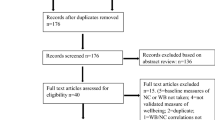Abstract
Criteria for well-being and spirituality are culturally bound. In this article, therefore, the notions of well-being and spirituality were reconsidered from a Korean perspective. Two major conceptual approaches that pertain to “subjective well-being” research in social psychology provide the methodological framework for this study. While “bottom-up” approaches focus on how external events and situations influence happiness, “top-down” approaches center on diverse variables within an individual and his or her culture. Noting the cultural differences between American and Korean self-construals (i.e., independence vs. interdependence), the author argues that Koreans need to construct “top-down” approaches to both well-being and spirituality. Reviewing Robert Emmon’s concept of “spiritual intelligence,” the author also suggests an integrative model for spirituality and well-being in Korea.

Similar content being viewed by others
References
Anderson, S. M. (1984). Self-knowledge and social inference: II. The diagnosticity of cognitive/affective and behavioral data. Journal of Personality and Social Psychology, 46, 294–307.
Anderson, S. M., & Ross, L. (1984). Self-knowledge and social inference: I. The diagnosticity of cognitive/affective and behavioral data. Journal of Personality and Social Psychology, 46, 280–293.
Diener, E. (1984). Subjective well-being. Psychological Bulletin, 95, 542–575.
Diener, E., Gohm, C., Suh, E., & Oishi, S. (2000). Similarity of the relations between marital status and subjective well-being across cultures. Journal of Cross-Cultural Psychology, 31, 419–436.
Diener, E., & Suh, E. (2003). Culture and subjective well-being. Boston, MA: MIT.
Emmons, R. A. (1999). The psychology of ultimate concerns: Motivation and spirituality in personality. New York: Guilford.
Emmons, R. A. (2000). Is spirituality an intelligence? Motivation, cognition, and the psychology of ultimate concern. The International Journal for the Psychology of Religion, 10, 3–26.
Gardner, H. (1996). Probing more deeply into the theory of multiple intelligence. NASSP Bull, 80, 1–7.
Goleman, D. (1995). Emotional intelligence: Why it can matter more than IQ. New York: Bantam Books.
American heritage dictionary (2001). The American heritage dictionary (4th ed.). New York: Houghton Mifflin.
Kakar, S. (1978). The inner world: A psychoanalytic study of childhood and society in India. Delhi, India: Oxford University Press.
Kwon, S.-Y. (2001). Codependence and interdependence: Cross-cultural reappraisal of boundaries and relationality. Pastoral Psychology, 50, 39–52.
Kwon, S.-Y., & Le, A. D. (2004). Relationship building in clinical pastoral education: A Confucian reflection from Asian chaplains. Journal of Pastoral Care and Counseling, 58, 203–214.
Lebra, T. S. (1976). Japanese patterns of behavior. Honolulu: University of Hawaii Press.
Markus, H. R., & Kitayama, S. (1991). Culture and the self: Implications for cognition, emotion, and motivation. Psychological Review, 98, 224–253.
Rieff, P. (1987). The triumph of the therapeutic: Uses of faith after Freud. Chicago: University of Chicago Press (original work published in 1966).
Schwarz, N., & Clore, G. L. (1988a). How do I feel about it? Informative functions of affective states. In K. Fiedler, & J. Forgas (Eds.), Affect, cognitions, and social behavior (pp. 44–62). Toronto, Ontario, Canada: Hogrefe.
Schwarz, N., & Clore, G. L. (1988b). Mood, misattributions, and judgments of well-being: Informative and directive functions of affective states. Journal of Personality and Social Psychology, 45, 513–523.
Suh, E., Diener, E., & Fujita, F. (1996). Events and subjective well-being: Only recent events matter. Journal of Personality and Social Psychology, 70, 1091–1102.
Suh, E., Diener, E., Oishi, S., & Triandis, H. C. (1998). The shifting basis of life satisfaction judgments across cultures: Emotions versus norms. Journal of Personality and Social Psychology, 74, 482–493.
Tillich, P. (1963). Christianity and the encounter of world religions. New York: Columbia University Press.
Wilson, W. (1967). Correlates of avowed happiness. Psychological Bulletin, 67, 294–306.
Author information
Authors and Affiliations
Corresponding author
Rights and permissions
About this article
Cite this article
Kwon, SY. Well-being and Spirituality from a Korean Perspective: Based on the Study of Culture and Subjective Well-being. Pastoral Psychol 56, 573–584 (2008). https://doi.org/10.1007/s11089-008-0134-1
Received:
Accepted:
Published:
Issue Date:
DOI: https://doi.org/10.1007/s11089-008-0134-1




